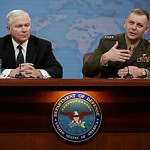President Barack Obama announced on Thursday that the United States would be shelving the proposal for a European missile defense shield. The proposal would have placed radar systems and interceptor missiles in Poland and the Czech Republic. Russia had repeatedly expressed their disapproval over the defense shield, arguing that it would have interfered with the systems that were already in place.
Immediately following the announcement, criticism from many sides voiced their opinions. Everything from how Obama caved to Russian pressures, to how America was abandoning its allies and their interests. Among the criticism came a defense of the decision by the Department of Defense.
In defense, they offered a four-phased agenda that would provide a higher level of protection than the previous plan proposed under the Bush administration. The previous plan would have offered interceptor missiles that had yet to be built and tested, while the four-phased plan would allow the defense system to evolve “as the Iranian threat potentially evolves.”
John Isaacs, executive director of the Center for Arms Control and Non-Proliferation said:
“The decision to revamp the missile defense plan in Europe is based on technological reality rather than rigid ideology. The Obama administration’s proposal is a better choice for U.S. And European security.”
The technological reality is that Iran does not possess the intermediate or intercontinental missiles that the Bush plan would have defended against. However, it is argued that they would not have capabilities for intercontinental ballistic missiles with nuclear capabilities until 2015.
It is no secret that Iran is pursuing nuclear studies. Iranian President Mahmoud Ahmadinejad continues to press the issue that it is for the sole purpose of providing nuclear energy, and not for nuclear arms. But, according to a secret report by the International Atomic Energy Agency (IAEA), Iran does have the ability for a nuclear weapon and have been working on a missile system capable of carrying it.
This decision comes before a summit next week where Obama will be meeting with Medvedev, and weeks before Obama sits down with Ahmadinejad.


